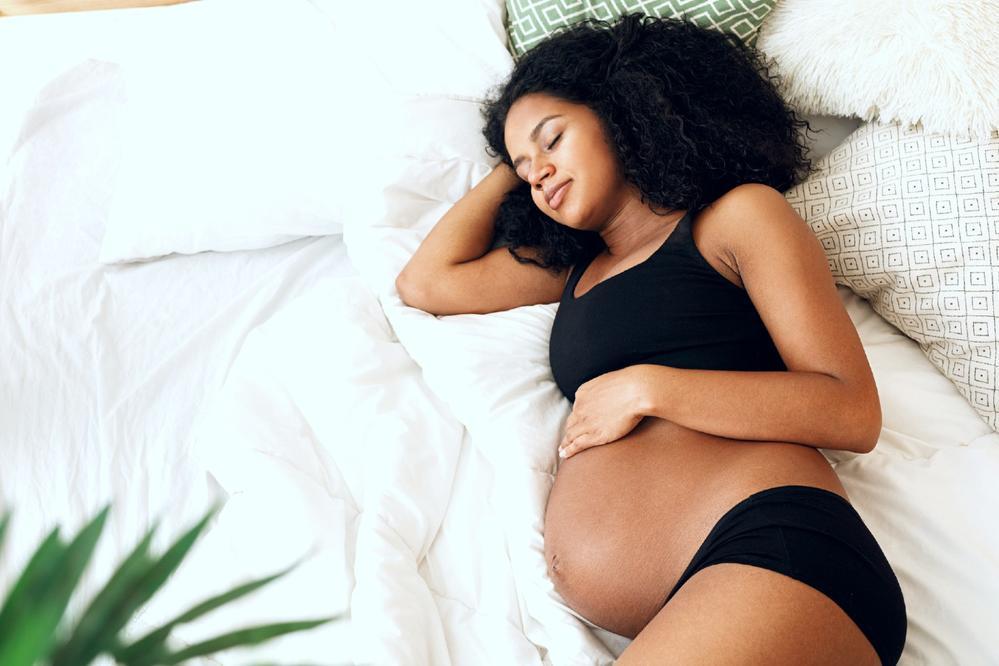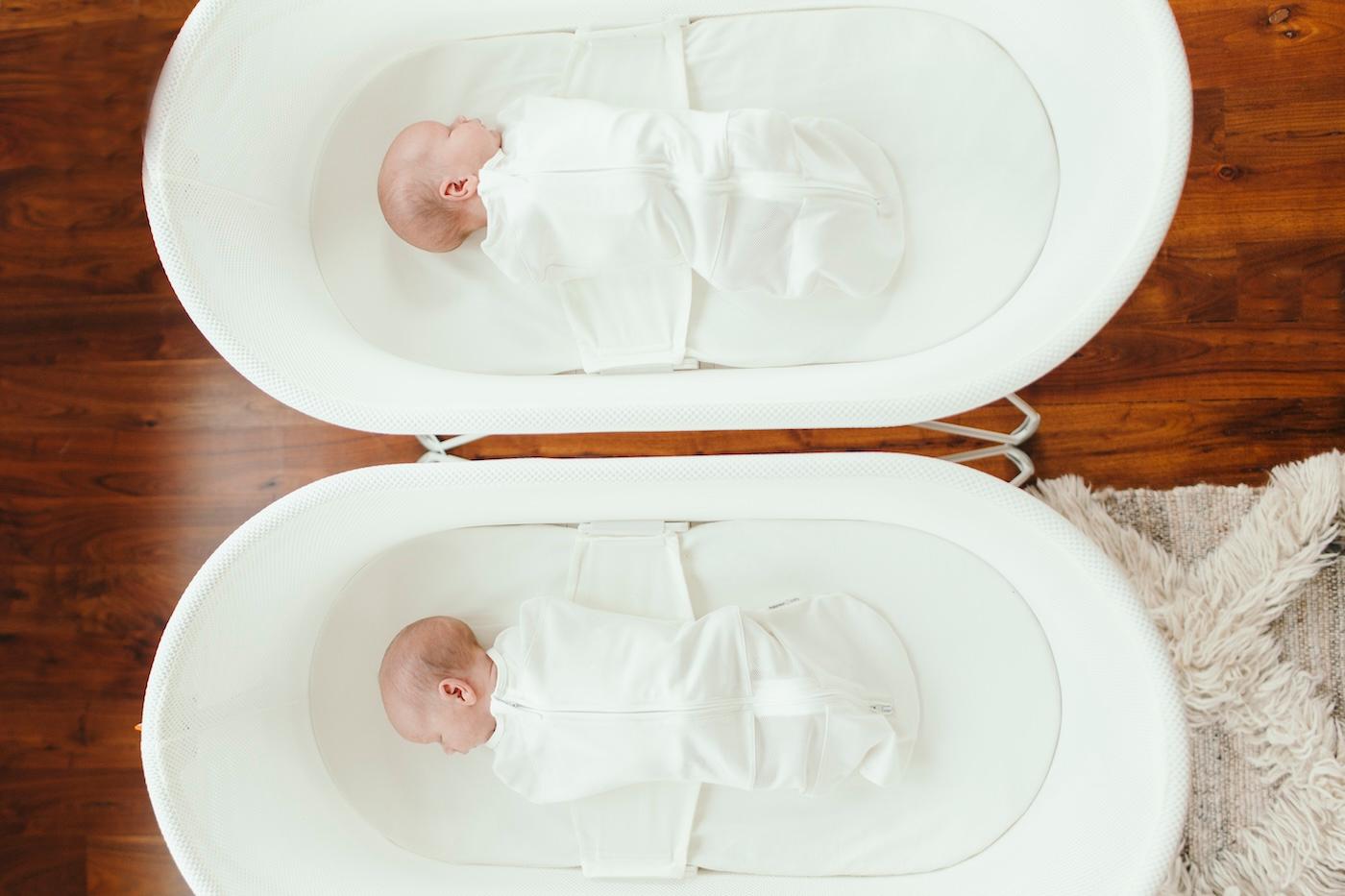PREGNANCY
Pregnancy Guide to Better Sleep
It is not a dream! You can improve your sleep during pregnancy. Here is how.

Written by
Happiest Baby Staff

If you are pregnant, you know that you need your sleep. Your body is working so hard, churning out extra blood, hormones, and more so you can grow an actual human being! You are achy. You are swollen. You are tired. And yet...sleeping while pregnant feels more like a dream than an attainable reality for so many.
In fact, 80% of mums-to-be say that it is difficult to find a comfortable sleeping position, nearly 60% report insomnia—and every single one of the 2,000+ people surveyed say that they experienced frequent night-waking while pregnant, according to a report in the journal Sleep Medicine. And you thought your sleep changed only after your baby arrived. Ha! But here is the thing: While you cannot magically sleep exactly like you did pre-pregnancy, you can greatly improve the sleep quality you are experiencing now—no matter your trimester.
Pregnancy Sleep Tip No. 1: Roll Over
Sleeping on your left side with your knees bent and a pillow under your belly (or between your legs) is considered the most comfortable sleeping-while-pregnant position. (Placing a rolled-up blanket at the small of your back can up the comfort, too.) Side-sleeping takes the pressure of your growing baby off your spine and your back muscles. It also helps to sidestep pregnancy-induced heartburn, which gets worse when you are lying on your back.
Another bonus: Sleeping on your left side avoids compressing your liver and improves blood flow to your heart, kidneys, and uterus...where your wee baby is growing! At the same time, left-side-sleeping is the safest way to snooze once you are about 20 weeks along, keeping your baby from putting the squeeze on a major blood vessel which can reduce blood return to the heart and cause low blood pressure. But if you wake up on your right side, do not panic! It is fine to roll to your right side for a bit, just try your very best to avoid lying flat on your back.
Pregnancy Sleep Tip No. 2: Adjust the Temperature
Your normal nighttime room temperature likely does not cut it anymore. During pregnancy, your blood volume can double. All of that extra plasma makes your blood vessels dilate, or widen, which allows more blood to the surface of your skin, causing you to feel hot and sweaty. Hormonal changes and all the extra work your heart is doing also work to raise your body temperature.
To help counter these changes, keep your bedroom cool, hovering between 15 and 20 degrees Celsius. And take a peek at your bedding: Mattresses made with thick foams absorb and trap body heat, increasing your body heat—as do sheets made of synthetic fibers. To keep things, cool at night, consider a mattress topper that is infused with a cooling gel, which can trap heat, drawing it away from the body. At the same time, swap your sheets for those made with natural fibers like cotton, linen, or bamboo. They are way more breathable and cooling than their synthetic counterparts.
Pregnancy Sleep Tip No. 3: Drink Water This Way
Pregnancy almost guarantees that you will wake in the middle of the night to use the bathroom. (You can thank the uptick of progesterone and the fact that your wee baby likes to lean on your bladder.) But silly as it may seem, drinking the right amount of water can actually help you sleep better. (Yes, water spurs peeing...but keep reading!)
During your second and third trimester you are at an elevated risk for nighttime leg cramps, thanks to a few things, like less calcium and magnesium coursing through your body, but also dehydration. To avoid nighttime peeing, many pregnant people drink less water, inadvertently causing a different sleep-disturbing issue! Solve both of these sleep issues by drinking 8 to 12 glasses of water every day, sipping mostly in the morning and afternoon...and swearing off liquids about two hours before lights out. Also helpful: Doing gentle leg stretches before bed; getting moderate daytime exercise; and eating plenty of calcium-rich foods. PS: staying properly hydrated can also help stave off another evening sleep-sapper: Braxton Hicks, aka 'false labour'.
Pregnancy Sleep Tip No. 4: Check Your Iron
Roughly 36% of mums-to-be deal with restless leg syndrome (RLS), which is marked by an uncontrollable urge to move your legs, usually at night when lying down for bed, according to a study in the Journal of Clinical Sleep Medicine. These folks are twice as likely to report poor sleep quality and are more likely to have excessive daytime sleepiness. While there is no singular cause of RLS in pregnancy, iron deficiency is one of the main culprits.
A lack of iron can alter how your brain processes certain sensations, which can lead to RLS. And because pregnant folks require twice as much iron than normal, it can be difficult to keep up. In fact, one in two pregnancies are affected by iron deficiency. Adding to the problem: Iron levels naturally drop around bedtime. Right now, the UK National Screening Committee does not recommend universal screening for iron deficiency in pregnancy, but if your sleep is getting sapped by RLS, do not hesitate to ask for a test! A doctor-advised iron supplement might be exactly what you need to catch some ZZZs.
Pregnancy Sleep Tip No. 5: Try White Noise
Surprise: White noise is not just to help babies sleep! As your bump steadily grows—and pregnancy hormones continue to race around your body—you will start to experience less deep (or slow-wave) sleep. As a result, you will awake more often. To off-set your new-found 'light sleeping' tendencies, use a white noise machine to help mask rouge sounds, like the early-morning garbage truck or your partner watching television in the next room, that may awaken you. White noise creates a blanket of sound that camouflages sudden changes in soundwave consistency that disrupt light sleepers. In addition, a 2017 report found that white noise can improve sleep quality—and help those with sleep issues fall into deep sleep more quickly.
Pregnancy Sleep Tip No. 6: Get Moving
The NHS recommends that pregnant folks clock at least 150 minutes of moderate-intensity aerobic activity each week during pregnancy, noting that spreading it out over the week is best. (Think: Taking a brisk 30-minute walk every day, five days a week.) Exercising during pregnancy is, of course, super helpful at reducing stress; upping flexibility and strength; readying your body for labour and delivery; and helping to manage new weird aches and ouches...and new research shows that moderate physical activity can improve sleep quality throughout pregnancy.
Specifically, moderate exercise can reduce the time it takes to fall asleep and decrease the amount of time folks lie awake in bed at night. If you are debating whether you should exercise inside or out—or in the morning or at night—consider that morning exposure to natural light further helps facilitate sleep. And the Mental Health Foundation reports that morning exercise tends to help you fall asleep easier than evening exercise. Bonus: Sun exposure can also boost levels of vitamin D and may even help prevent preterm birth.
For more pregnancy advice, check out these articles:
- Your Top Pregnancy Questions—Answered!
- 12 Early Signs of Labour
- Learn the Signs of Preeclampsia
- Your Gestational Diabetes Need-To-Know
Disclaimer: The information on our site is NOT medical advice for any specific person or condition. It is only meant as general information. If you have any medical questions and concerns about your child or yourself, please contact your health provider. Breastmilk is the best source of nutrition for babies. It is important that, in preparation for and during breastfeeding, mothers eat a healthy, balanced diet. Combined breast- and bottle-feeding in the first weeks of life may reduce the supply of a mother's breastmilk and reversing the decision not to breastfeed is difficult. If you do decide to use infant formula, you should follow instructions carefully.
SHARE THIS ARTICLE
PARENT PICKS
Bestsellers



















